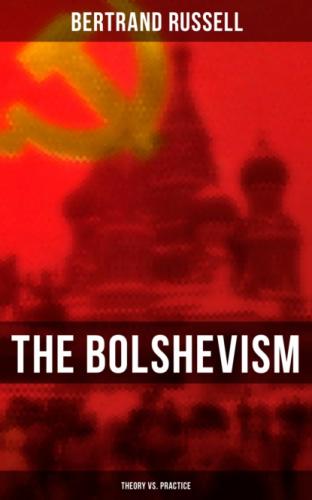Bertrand Russell
The Bolshevism: Theory vs. Practice
Published by
Books
- Advanced Digital Solutions & High-Quality eBook Formatting -
2021 OK Publishing
EAN 4064066380670
Table of Contents
Part I. The Present Condition of Russia
I. What is Hoped from Bolshevism
V. Communism and the Soviet Constitution
VI. The Failure of Russian Industry
I. The Materialistic Theory of History
II. Deciding Forces in Politics
III. Bolshevik Criticism of Democracy
IV. Revolution and Dictatorship
V. Mechanism and the Individual
VI. Why Russian Communism has Failed
VII. Conditions for the Success of Communism
PREFACE
The Russian Revolution is one of the great heroic events of the world's history. It is natural to compare it to the French Revolution, but it is in fact something of even more importance. It does more to change daily life and the structure of society: it also does more to change men's beliefs. The difference is exemplified by the difference between Marx and Rousseau: the latter sentimental and soft, appealing to emotion, obliterating sharp outlines; the former systematic like Hegel, full of hard intellectual content, appealing to historic necessity and the technical development of industry, suggesting a view of human beings as puppets in the grip of omnipotent material forces. Bolshevism combines the characteristics of the French Revolution with those of the rise of Islam; and the result is something radically new, which can only be understood by a patient and passionate effort of imagination.
Before entering upon any detail, I wish to state, as clearly and unambiguously as I can, my own attitude towards this new thing.
By far the most important aspect of the Russian Revolution is as an attempt to realize Communism. I believe that Communism is necessary to the world, and I believe that the heroism of Russia has fired men's hopes in a way which was essential to the realization of Communism in the future. Regarded as a splendid attempt, without which ultimate success would have been very improbable, Bolshevism deserves the gratitude and admiration of all the progressive part of mankind.
But the method by which Moscow aims at establishing Communism is a pioneer method, rough and dangerous, too heroic to count the cost of the opposition it arouses. I do not believe that by this method a stable or desirable form of Communism can be established. Three issues seem to me possible from the present situation. The first is the ultimate defeat of Bolshevism by the forces of capitalism. The second is the victory of the Bolshevists accompanied by a complete loss of their ideals and a régime of Napoleonic imperialism. The third is a prolonged world-war, in which civilization will go under, and all its manifestations (including Communism) will be forgotten.
It is because I do not believe that the methods of the Third International can lead to the desired goal that I have thought it worth while to point out what seem to me undesirable features in the present state of Russia. I think there are lessons to be learnt which must be learnt if the world is ever to achieve what is desired by those in the West who have sympathy with the original aims of the Bolsheviks. I do not think these lessons can be learnt except by facing frankly and fully whatever elements of failure there are in Russia. I think these elements of failure are less attributable to faults of detail than to an impatient philosophy, which aims at creating a new world without sufficient preparation in the opinions and feelings of ordinary men and women.
But although I do not believe that Communism can be realized immediately by the spread of Bolshevism, I do believe that, if Bolshevism falls, it will have contributed a legend and a heroic attempt without which ultimate success might never have come. A fundamental economic reconstruction, bringing with it very far-reaching changes in ways of thinking and feeling, in philosophy and art and private relations, seems absolutely necessary if industrialism is to become the servant of man instead of his master. In all this, I am at one with the Bolsheviks; politically, I criticize them only when their methods seem to involve a departure from their own ideals.
There is, however, another aspect of Bolshevism from which I differ more fundamentally. Bolshevism is not merely a political doctrine; it is also a religion, with elaborate dogmas and inspired scriptures. When Lenin wishes to prove some proposition, he does so, if possible, by quoting texts from Marx and Engels. A full-fledged Communist is not merely a man who believes that land and capital should be held in common, and their produce distributed as nearly equally as possible. He is a man who entertains a number of elaborate and dogmatic beliefs—such as philosophic materialism, for example—which may be true, but are not, to a scientific temper, capable of being known to be true with any certainty. This habit, of militant certainty about objectively doubtful matters, is one from which, since the Renaissance, the world has been gradually emerging, into that temper of constructive and fruitful scepticism which constitutes the scientific outlook. I believe the scientific outlook to be immeasurably important to the human race. If a more just economic system were only attainable by closing men's minds against free inquiry, and plunging them back into the intellectual prison of the middle ages, I should consider the price too high. It cannot be denied that, over any short period of time, dogmatic belief is a help in fighting. If all Communists become religious fanatics, while supporters
